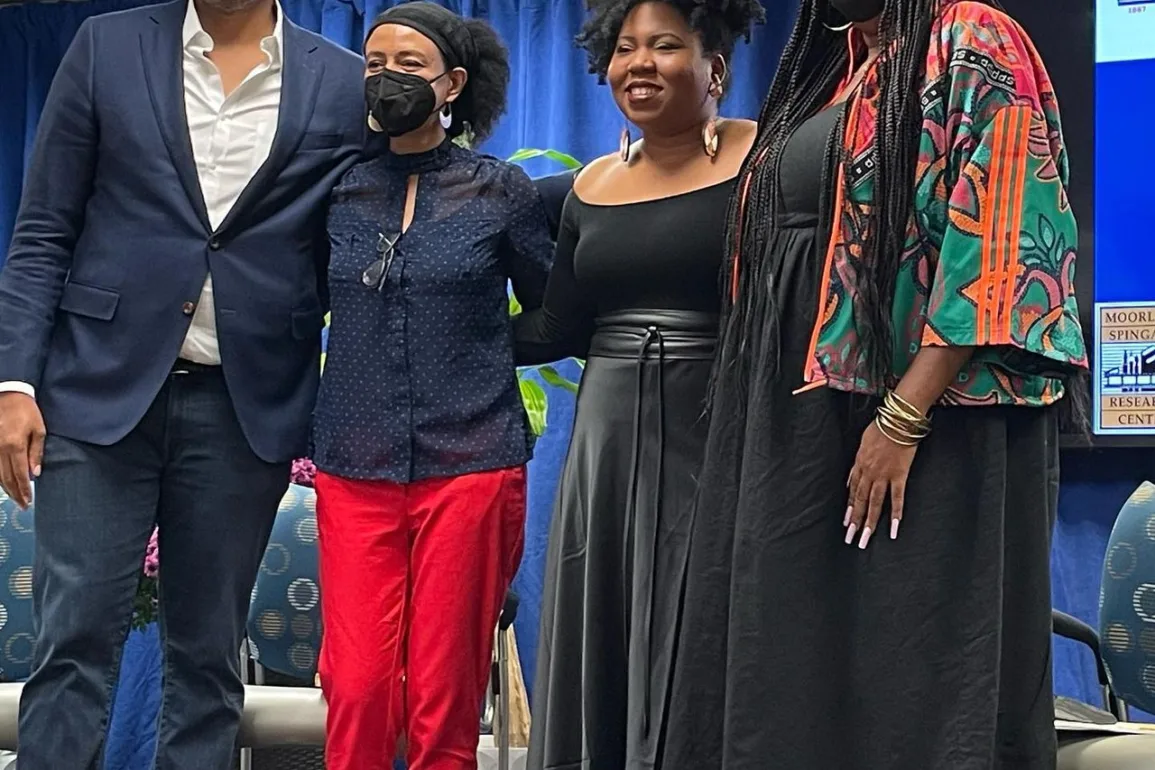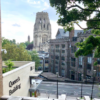How many topics can you fit into a 20-minute talk with Ta-Nehisi Coates?
On a recent Thursday afternoon, ahead of a trip Coates will make to Alabama to receive a major literary award, I was about to find out. That morning, Coates’ team asked if he could push our interview back by 10 minutes. They wanted to make sure he was comfortably seated in the back seat of a car and could speak without interruption.
A few hours later, Coates phoned in from New York, en route to the Apollo Theater in Harlem. He’s the legendary performance hall’s Master Artist in Residence. Earlier this summer, Coates and Kamilah Forbes, the executive producer for the Apollo, announced the inaugural [at] The Intersection festival, a three-day summit of art and ideas. Set to debut in October, the event bills itself as a showcase of Black creativity and fellowship featuring keynotes and performances from luminaries including journalist Michael Harriot, bassist Endea Owens, chef Carla Hall, and award-winning actress Kerry Washington.
“We gotta do some promo work, so I’m on my way there,” Coates tells me.
He’s also working on his next book. When I asked about the subject, he didn’t reveal too many details, but he did offer a short description.
“It’s a book about writing and the place of writing in our culture and politics.”
Coates’ passion and achievement in the craft of writing is being recognized in Alabama. The journalist and cultural critic is the recipient of this year’s Fitzgerald Prize for Literary Excellence. The award, granted by The Scott and Zelda Fitzgerald Museum in Montgomery, honors an author whose work continues the legacy of storytelling and social insight typified by novelist and playwright F. Scott Fitzgerald.
“The Great Gatsby is like one of my three favorite books ever. So it’s a huge, huge honor,” said Coates.
Coates will accept the award on Sept. 22 during “An Evening with Ta-Nehisi Coates Celebrating American Storytelling.” The Friday evening award ceremony and lecture kicks off at 6:30 p.m. at Ralph David Abernathy Hall on the campus of Alabama State University. The event also will feature Coates in conversation with two ASU professors: Dr. Derryn Moten and Dr. Jaqueline Trimble. (Tickets to the ceremony and lecture are $28 and are available on Eventbrite.)
Coates’ travel and in-person lecture schedule is back up and running after a couple of dormant years during the height of the COVID-19 pandemic.
Last year, his activities included moderating the inaugural MSRC International Black Writers Festival at Howard University, where one of the participants was Ashley Jones, the author of “Reparations Now!” and Alabama’s first Black and youngest poet laureate.
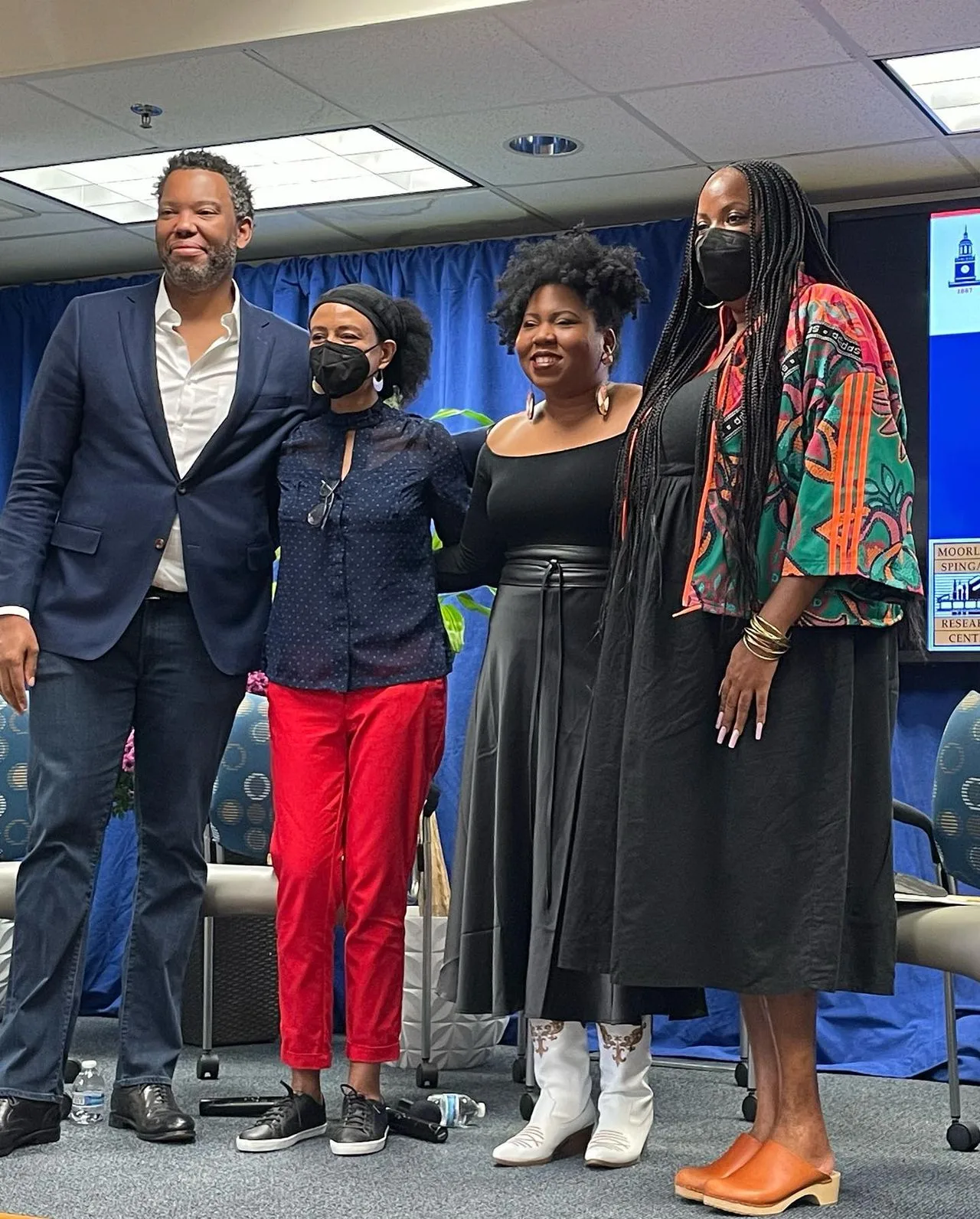
Alabama Poet Laureate Ashley Jones poses for a photo during Howard University’s MSRC International Black Writers Festival in 2022. The event was moderated by Ta-Nehisi Coates (Courtesy, Ashley Jones)
If you’ve been keeping up with Coates in the news, you may have read about his appearance at a school board meeting in South Carolina. He sat next to Mary Wood, an English teacher who had asked her Advanced Placement students to read “Between the World and Me” and identify themes in the work. Some of her students emailed school board members, saying the lesson made them feel “uncomfortable” and “ashamed to be Caucasian.” The books were collected and the assignment was ended, according to multiple reports. South Carolina is one of nearly 20 states to restrict education on race since 2021. An article from the Washington Post this week reported one student’s email said reading the book felt like “reading hate propaganda towards white people.”
Coates is used to finding himself and his writing in the middle of discussions that could influence the course of American history.
In 2014, The Atlantic published “The Case for Reparations,” Coates’ examination of housing discrimination, redlining and segregation. Throughout more than 50 pages in the magazine, Coates unpacked the effects of racist housing policies through the eyes of a cast of people who had been marginalized for generations.
In 2019, Coates, actor Danny Glover, and Sen. Cory Booker (D-NJ) testified before a House Judiciary subcommittee hearing on reparations for slavery. The room had gathered for a hearing on H.R. 40, a bill sponsored by Rep. Sheila Jackson Lee (D-Texas) which called for a commission to study and develop reparations proposals for African Americans.
During his opening statement, Coates directed remarks to Senate Majority Leader Mitch McConnell, who said reparations were not “a good idea” because no one who is currently living is responsible for slavery.
[WATCH THE FULL TESTIMONY HERE]
Alabama itself is a case study for examples of reparations and restitution for Black people. In the 1970s, a class action lawsuit from the Tuskegee Syphilis Study resulted in a $10 million settlement. Sarah Collins Rudolph, who was severely injured in the 1963 bombing of the 16th Street Baptist Church, has long called for financial compensation to cover her decades of medical bills.
In 2020, lawyers representing Rudolph wrote a letter to Gov. Kay Ivey asking for an official apology from the state and possible compensation. While Ivey issued an apology, the state has yet to move toward considering financial restitution.
RELATED:
Civil Rights bombing victim’s claim raises reparations question for Alabama
Alabama sidesteps compensation for survivor of 1963 KKK Birmingham church bombing
One of the biggest potential case studies for reparations and the H.R. 40 bill in the state is Africatown and the descendants of the Africans enslaved on the Clotilda. Members of the public thought the release of the 2022 documentary, “Descendant” would renew conversations about restitution for the South Alabama community.
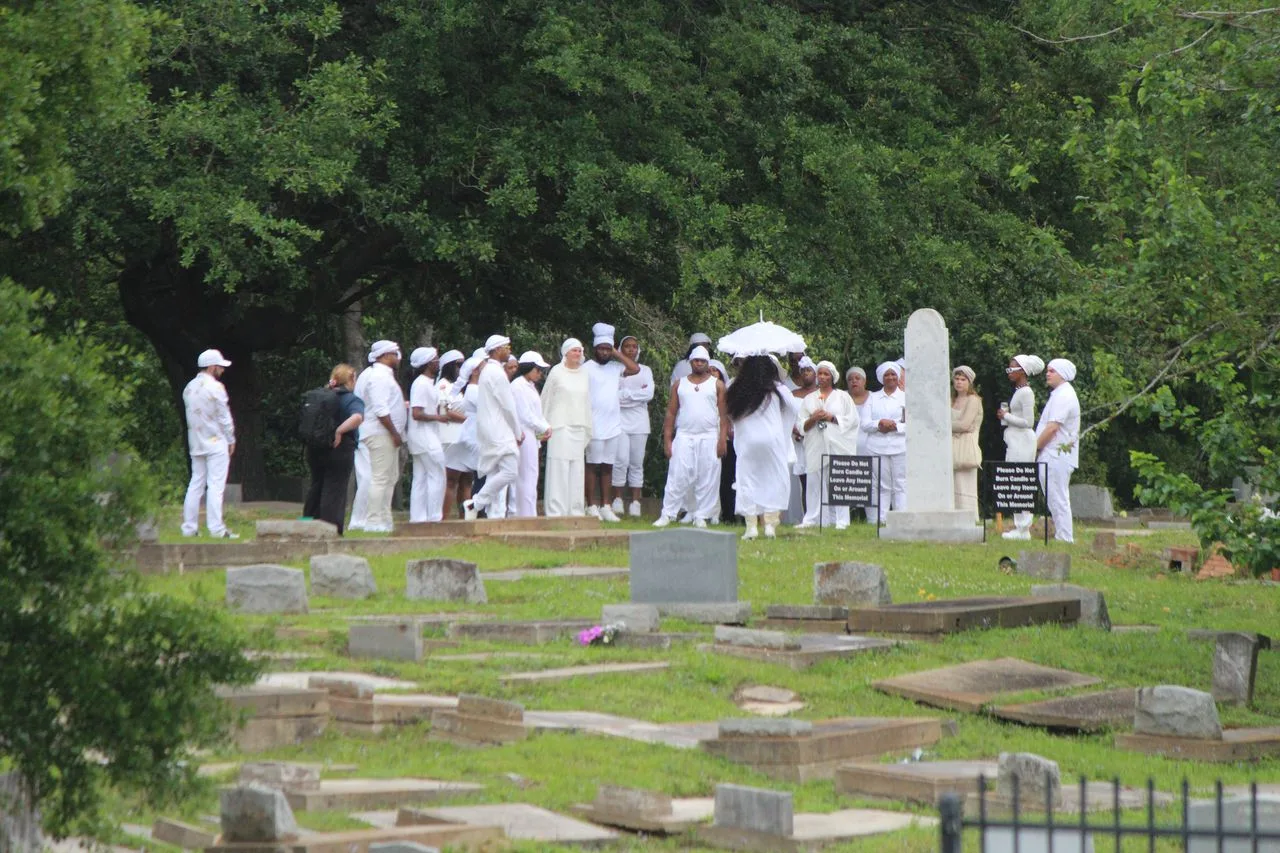
A group of people dressed in white attend a ceremony at the Africatown cemetery on March 31, 2023 (Shauna Stuart| AL.com)
But Joycelyn Davis, a descendant of Clotilda captives who is prominently featured in the film, isn’t convinced she’ll see a productive conversation about reparations in her lifetime.
“What is reparations? Reparations is repair. Is it scholarships? Is it homes? Is it development? And, where is this great attorney that’s going to go after it for us?” Davis responded when I asked her opinion about reparations after a screening of the documentary in Birmingham.
READ MORE: After ‘Descendant,’ what’s next for Africatown?
“I’ve been told it can’t be someone on the local level and we’re going to have to go outside for someone to represent us. Where is that person? The film is out. I’m not going to say everybody knows the story, but the story is out there. So where is that attorney that will help us understand the steps for reparations?”
We talked to Coates about reparations, writing, and the art of storytelling. Here’s an edited version of our conversation below.
AL.COM: You’re probably not going to remember this because it was in 2015, but I actually lived in Boston at the time and you came to Boston College to do a book signing and talk about “Between the World and Me.” That was a while ago. So this is a cool full circle moment.
TA-NEHISI COATES: Ah, okay, okay! There was protest that night, right?
There was definitely something going on on campus. And I think during the question and answer session, a student asked you your opinion about it.
T.C. Yeah, I remember that.
Yeah, I remember that very vaguely. And after the session, you signed my copy of “Between the World and Me.” I actually bought my copy of The Atlantic with your cover story that month, “The Black Family in the Age of Mass Incarceration” and you signed that too.
T.C. Oh, that’s wonderful! That’s wonderful.
I’m going to start with a quick easy question. What are you listening to right now, in terms of music? Because you’re a lauded hip-hop scholar and people have actually made playlists based on the songs you’ve written about in your books. But you listen to jazz as well, right?
T.C.: I do, yeah. I’m a huge John Coltrane fan.
Speaking of Coltrane, this year is the 60th anniversary of the 1963 civil rights movement in Birmingham. And I’ve been doing some reading about John Coltrane’s “Alabama.” The first recording was in November 1963, I believe. The song was his response to the bombing of the 16th Street Baptist Church.
So, what are you listening to right now? You said John Coltrane. Who else?
T.C.: It’s kind of interesting. I’ve been playing a lot of ‘80s, like R&B [laughs]. I think ‘cause it just reminds me of being young. You know, a lot of Cherrelle. Luther. A little New Edition. Alexander O’Neal.
Let’s talk about “The Case for Reparations.” I know we’re going back to 2014, but I want to talk about storytelling, especially since you’re writing a book about storytelling and writing. So, what questions did you ask going into that project? You don’t have to tell all of your secrets, but what did you really want to know?
T.C: By the time it came time to write it, I was pretty convinced of the case. I was interested in the scope and methodology.
Well, let me back up a little bit. I thought housing segregation was a deeply underlooked phenomenon. I thought so because I think it is not quite as visual as other forms of segregation. There are no, you know, “whites only” signs. There are no instances of the National Guard having to be mobilized. No George Wallace standing at the door.
But the fact of the matter is, for most Americans, large swaths of their wealth are actually in housing, in their homes. So, if you restricted–as we did for large parts of the 20th century– where people could live, what kind of housing they could buy, what they had access to, you are effectively restricting their wealth.
You restricted who they could borrow from, how they could borrow, the terms of which they could borrow. You basically were restricting their ability to build wealth. And folks had written on this as having huge explanatory power for understanding the wealth gap between Black and white families. On top of that, it was the fact that at this very moment [while] Black wealth-building opportunities were being restricted, they were being aided among white people. And so I just understood that both as net wealth transfer, because you pay taxes to the government. You pay taxes to the government and the government aids some people with wealth-building opportunities and disempowers other people. You know, you’ve effectively been robbed.
And so, understanding that, I also felt that it was quite probable that there would be people who were alive who had experienced that. And I knew that one of the things that people often said about reparations was, “Hey, the people who suffered and people that did it are long gone.” And when you think about housing segregation, no, they’re not. They’re right here, right here. And I just set out with a goal to find them.
Let’s continue on the subject of reparations. Zora Neale Hurston, who is an Alabama native, wrote “Barracoon,” her book about the Clotilda, the last ship to bring captive Africans to the United States. The ship was found a few years ago. The rediscovery of the Clotilda has also prompted conversations about reparations for the community and what that would look like for the descendants of the slaves on that ship and people who live in Africatown.
What is your advice for writers who want to document and examine those conversations? When you’re telling the narrative of a community that’s been disenfranchised, what questions should you ask?
T.C.: I know for me, it was really, really important, as specifically as possible to quantitatively and qualitatively, and especially qualitatively allow people to understand what I meant.
The term reparations is the one we have, but what I was really trying to get across was that these people were robbed.
And that’s the first step. I’ve never been to Africatown, but, if I were telling that story, slavery would be the beginning. It would not be the end of the story. It would be the foundation. Because I’m quite sure they continued to be robbed.
I think depicting these stories as though robbery ended in 1865 is foolish and unfortunate. Segregation is robbery and we don’t really see it that way, but it is. You pay your taxes to a state. If you are obedient to a state, if you obey the laws of the state, you swear fealty to a state. And you are given less service than somebody else. As policy, you are being robbed. I am taking something from you.
So framing it that way is extremely, extremely, extremely important. And taking it out of the language of manners and politesse and was somebody nice to you and opening their heart. No! No. No. No. No. This is a material question. It’s very much a material question. And so to depict it that way. I just think it’s really, really important.
I have to say to you, I don’t see much of this in the popular writing I see about reparations. But to picture Black people as this mass lump of people who were just done wrong, I think it’s really, really important to specifically say as much as possible, what happened. What actually happened. And to frame it within the terms of robbery. I just think that’s important.
Let’s switch gears. So, you’re also a poet, and you talk about that in detail in “Between the World and Me.”
T.C.: I was! I was. Not anymore. [LAUGHS] I started off there.
In that vein, how does your past experience of writing poetry inform and strengthen your storytelling now?
T.C: I think it gave me a basic respect for language. And a basic respect for the rhythm and the sense of it. That’s what I would say. I would say that was the biggest [lesson]. How you say things is as important as what you say. So I think that was a big part of it. You’re trying to make people feel something that’s important. All of that I learned in my time as a poet.
Like I was saying earlier, you’re a scholar of hip hop and people have made playlists about your work. But in 2017, “Between the World and Me” was produced for the stage, and jazz artist Jason Moran produced the score. What was it like to bring your work to life on stage, and what was it like to work with Mr. Moran to do a score of your work? Can we talk about that?
T.C.: Sure, but I wasn’t involved in it.
Oh, that’s no problem at all. I mean, even if you weren’t involved in the actual score, what was it like seeing your work play out on stage?
T.C. Oh, it was great to see it. I’m just telling you creatively, I was not very involved. And that was my choice. Because that’s not my area. That’s not what I do. I have a good friend who has a really, really great knowledge of it. This was her vision. It’s what she wanted to do. I thought she did a fantastic job. But yeah, it wasn’t really my project.
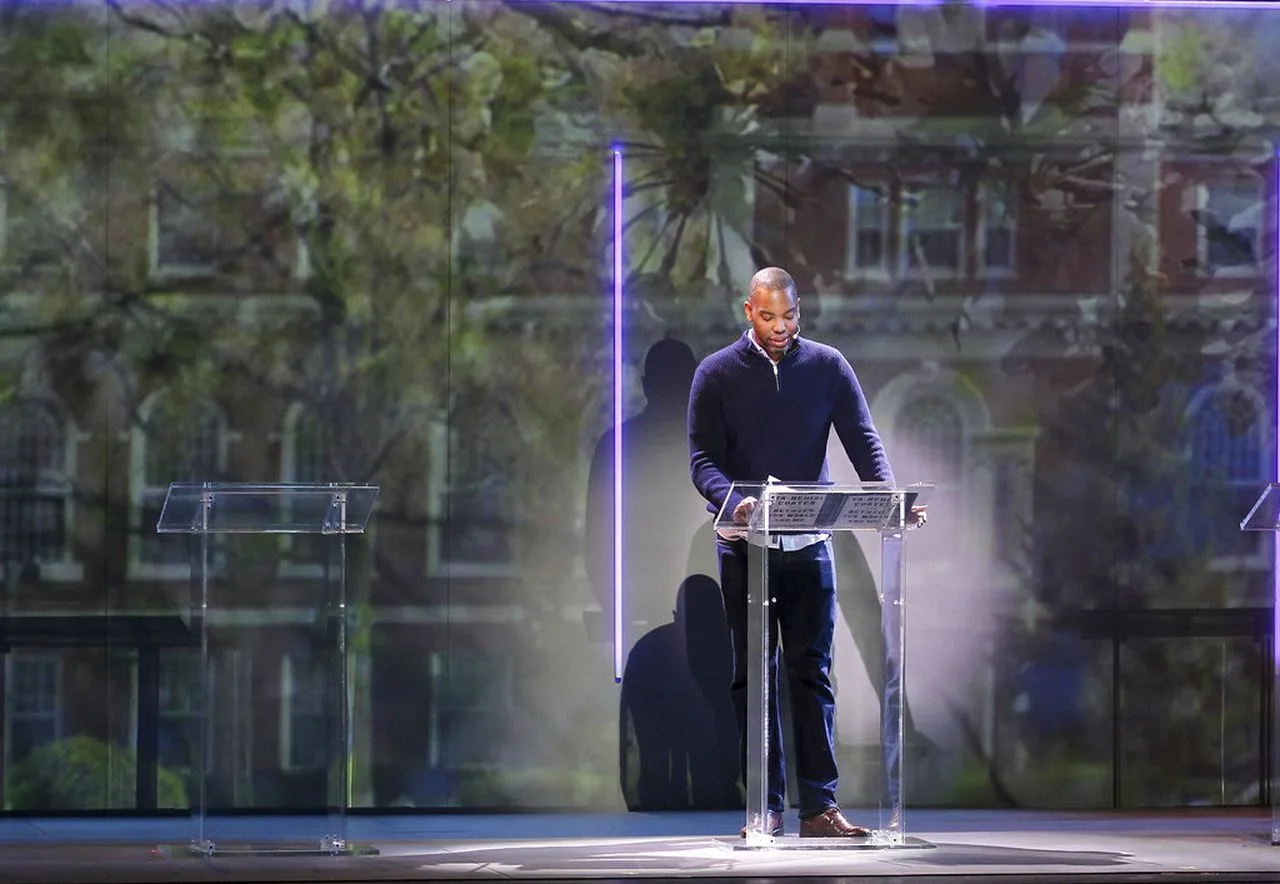
Writer Ta-Nehisi Coates participates in the first-ever theatrically staged reading of his prize-winning book “Between the World and Me” at the Apollo Theater on Monday, April 2, 2018, in New York. (Photo by Donald Traill/Invision/AP)Donald Traill/Invision/AP
How did you feel when you saw it?
T.C.: Oh, it was overwhelming. It was overwhelming. A little embarrassing, you know what I mean? Cause it’s, it’s your words up there and I’m one who edits to the very end. So, you know, slightly embarrassing. But it was quite remarkable. I thought Kamilah [Forbes] did a tremendous job.
So, you were a poet in your past life. Who are some of your favorite poets? There’s the marriage of jazz and written word. We had the Black Arts Movement. We had Gil Scott-Heron. We have Sonia Sanchez who is from Birmingham. So talk a little bit about your favorite poets.
T.C. Well, I mean, Sonia. You can start there. I love her. The black arts movement was very important to me. She was. Baraka was. Larry Neal was. Probably beyond that, Yusef Komunyakaa, Carolyn Forché, quite a few people. I did a period of really, really intensive reading very early on. And I was just really involved as a young person, you know? [I admired] what these people were doing and how they could do it in such a short space.
So, I don’t know if you’ve heard about this, but Javon Jackson and Nikki Giovanni put out an album a couple of years ago called “The Gospel According to Nikki Giovanni.” It’s really good. I haven’t finished listening to it, but I saw them perform it at the Atlanta Jazz Festival in May. So if you’re interested in adding that to your playlist, you should. I know you didn’t ask me for suggestions, but I just gave one to you!
T. C.: That’s all right!
I want to end on this note, and this is a very simple question. But I’ve been attending writing workshops and one of the things you hear in every writing workshop is that to become a better writer, you have to read. I attended a virtual workshop run by Deesha Philyaw, the author of “Secret Lives of Church Ladies,” and she said she can tell when writers don’t read because it leaps off the page.
In light of that, and in light of expanding knowledge about writing, why is reading so critical to becoming a better writer and storyteller?
T.C.: Oh, I mean for the same reason that you can’t really learn to cook without watching somebody cook. You gotta study what people are doing. It’s pretty simple. It’s very hard to know how to do something if you don’t study it. It’s like anything else. How are you gonna repair a car if you don’t watch somebody, you know, repair a car? I just think it’s how we learn. So it’s very, very important.


